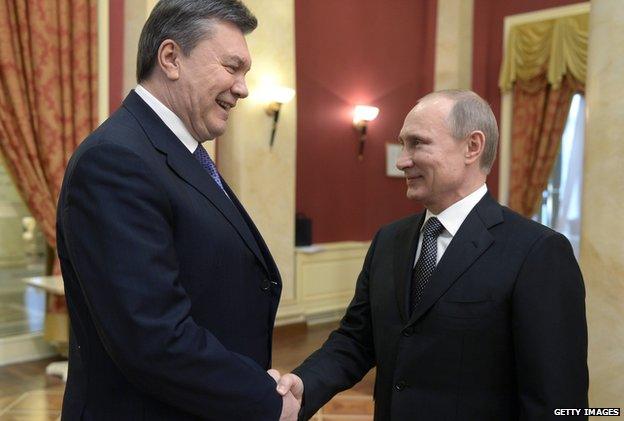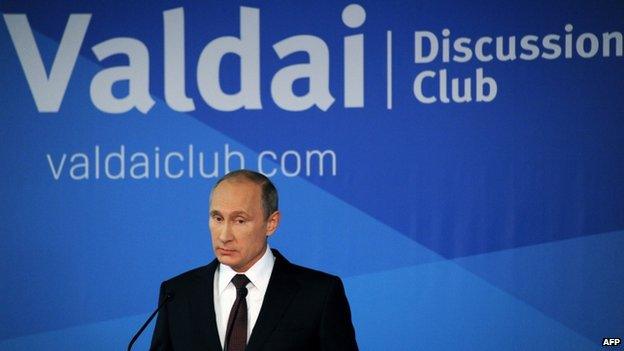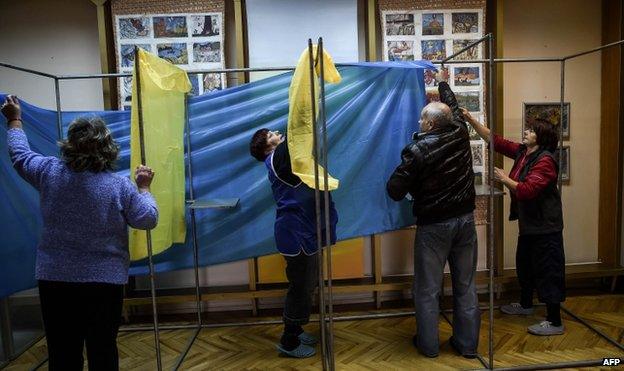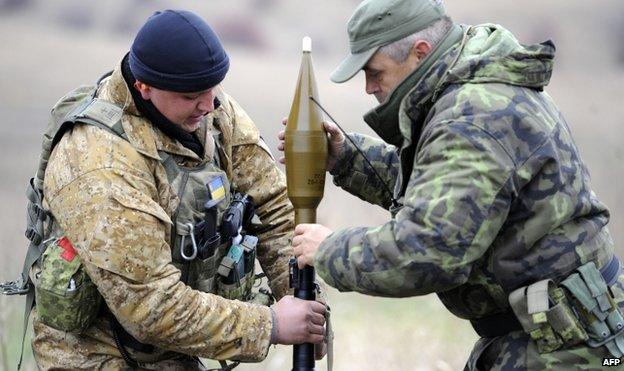Putin: Russia helped Yanukovych to flee Ukraine
- Published

Ukraine's pro-Russian President Viktor Yanukovych (left) was ousted in February
Russia helped ousted Ukraine President Viktor Yanukovych to flee from violent protests in February, Russian leader Vladimir Putin has said.
It is the first time Mr Putin has given details of how he helped his ally escape.
Russian speakers in Ukraine's east mostly backed Mr Yanukovych and were enraged at his overthrow, which helped to fuel months of violence.
Ukraine is electing a new parliament on Sunday, but eastern separatists will hold their own vote next month.
German Chancellor Angela Merkel has told Mr Putin that the elections in the east must be held under Ukrainian law.
Overthrow
Speaking to members of the Valdai discussion club in Sochi, Mr Putin said Mr Yanukovych had been removed by force.
Mr Yanukovych fled to Russia in February after protests in which more than 100 people died.
"I will say it openly - he asked to be driven away to Russia, which we did," the Russian president said.

Vladimir Putin used his speech in Sochi to criticise the US
He went on to criticise the pro-Western government in Kiev for using force against the rebels rather than conducting talks.
"We see the same thing over and again... suppress by force," he said.

Analysis: Bridget Kendall, BBC News, Sochi
Vladimir Putin looked calm and relaxed. He cracked jokes. He claimed Russia did not want confrontation and bore no grudge because of sanctions.
All that was needed, he said, was to restore the balance lost when the Soviet Union disappeared as a global counterweight to US power. All Russia wanted was for Russian interests to be respected.
That's the key to understanding Mr Putin these days: from the Ukraine crisis to violence in the Middle East, he claims that all the turbulence in the world is due to mistakes made by an American superpower which erroneously believed that it was the sole victor of the Cold War and could shape the world to suit its exclusive interests.
The problem, he says, is a world without rules where the US has run rampage.
Over Ukraine, he denies that Russia violated international law and or breached sovereignty. Russia's annexation of Crimea was fulfilling Crimea's right to self-determination. As for hostile propaganda to create a new enemy, this was an American tactic, aimed at Russia, not vice versa.
Indeed almost every criticism he made of the US could be applied to Russia itself. But in Mr Putin's scathing denunciation of American power, he simply refuses to acknowledge it.

Violence has continued in eastern Ukraine despite a ceasefire which came into place on 5 September.
At least 3,700 people have been killed in the conflict which broke out in April between Ukrainian forces and pro-Russian separatist rebels in the eastern regions of Donetsk and Luhansk.
Ukraine's government in Kiev hopes Sunday's parliamentary elections will help stabilise the country.
Approaching winter
Meanwhile, Germany's Chancellor Merkel has urged a quick resolution to the dispute over Russian gas supplies.
In a phone call, Ms Merkel called on Mr Putin "to firmly support the search for a swift solution before the approaching winter," a statement from her office said.
Russia cut off Ukraine's gas supplies in June over unpaid bills and has warned that supplies to Europe would be reduced if Ukraine tried to circumvent the blockade.
Representatives from Russia, Ukraine and the European Union will meet in Brussels next week to discuss the gas dispute.

Preparations are under way in Kiev for the parliamentary vote on Sunday

Government forces are still fighting separatists in the Donetsk region in eastern Ukraine
The Ukraine crisis has pushed relations between Russia and the West to a new low.
President Putin used his speech on Friday to accuse the US of destabilising the world by trying to enforce its will on other countries.
He rejected suggestions that Moscow is trying to recreate the Soviet Union or undermine neighbouring states.
"Claims that Russia is trying to rebuild some empire, is encroaching on the sovereignty of its neighbours are also groundless," he said.
Correction 11 November 2014: This report has been amended to clarify that, while Mr Putin had spoken previously of helping Mr Yanukovych to flee, this was the first time he had given any details.